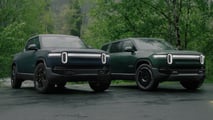
Rivian has confirmed that its vehicles will soon be able to provide bidirectional charging to homes and other vehicles thanks to a new charger that it will soon formally announce.
The all-electric automaker startup told investors earlier this week that it planned to release a new permanently mounted wall connector that enables owners to sap power from the R1's battery pack to power their homes when the lights go off.
Get Fully Charged
Rivian's Updated R1 Coming Soon
Rivian recently announced that it would be updating its R1 platform with some big changes. These include design changes, new battery chemistry, significantly reduced cost to produce, and the option for even more power. But don't worry; existing R1 owners won't be left out of the V2H game with this newly teased wall connector.
"We will be announcing this later, but we will be offering a bidirectional charge that you can mount on the wall of your garage where you park your car," said Rivian's VP of Hardware Engineering, Vidya Rajagopalan, during the automaker's investor call earlier this week.
Gallery: 2025 Rivian R1T and R1S







Rajagopalan says that the new charger will help to dispel a "common misconception" that its vehicles can't provide vehicle-to-home capability with its current R1 vehicles.
Currently, Rivian R1 vehicles do not offer Vehicle-to-Home (V2H) charging. However, the automaker has previously said that it was working on a bidirectional charger and confirmed that R1 vehicles had the hardware necessary to activate V2H charging at a moment's notice—presumably through an over-the-air update pushed with the release of its new wall charger.
The R1 will reportedly offer up to 24 kilowatts of DC power, while the R2 platform will have the hardware onboard to also deliver 11 kW of AC power.
A lot has changed since those announcements. Rivian announced the refresh to the R1 platform, and the R2 and R3 were announced. It also announced the development of a new zonal architecture for its future vehicles and a joint venture with Volkswagen. However, Rivian's commitment to switch from CCS to Tesla's NACS connector in 2025 is the most relevant change.

Rivian has previously said that its V2H program relied on the CCS charging standard, so it's not clear how the move to NACS could affect the charger or if the change in standard delayed the launch of the V2H charger. Presumably, this will result in a dual-connector ecosystem. This change could result in a single charger with a Tesla-esque Magic Dock connector, or Rivian could have two different charging products.
Rivian could not provide InsideEVs with any additional information on NACS compatibility at the time of writing.
Now, Rivian isn't the only automaker that has enabled V2H charging in its EVs. Ford equipped the F-150 Lightning with V2H, and General Motors planned to include V2H capabilities in the Silverado EV and expand it to more Ultium-based vehicles later on.
Rivian has not announced when the charger will go on sale or the actual cost of the product. However, that hasn't stopped owners from getting giddy about the potential to use their vehicles as a battery backup for their homes.







